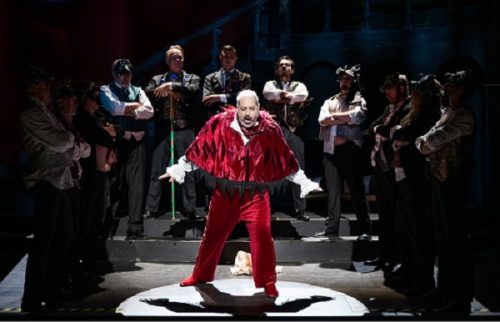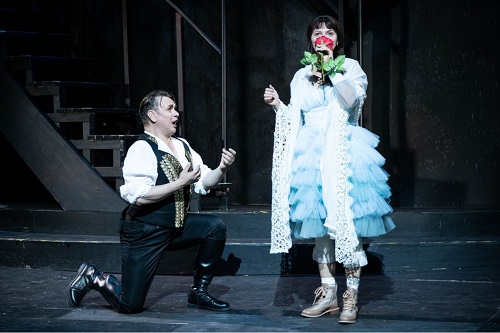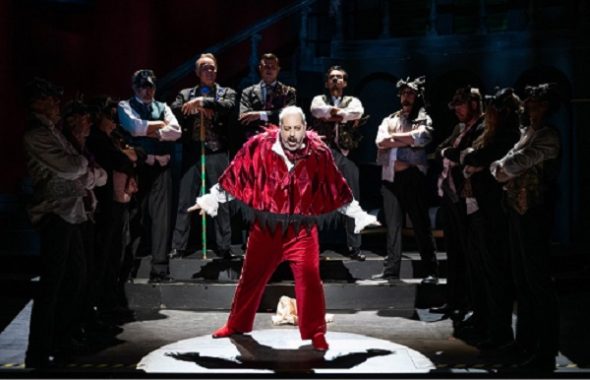 Sweden Verdi, Rigoletto: Soloists, The Opera på Skäret Chorus, Swedish Chamber Orchestra / Lorenzo Coladonato (conductor). Opera på Skäret, Kopparberg, 29.7.2023. (GF)
Sweden Verdi, Rigoletto: Soloists, The Opera på Skäret Chorus, Swedish Chamber Orchestra / Lorenzo Coladonato (conductor). Opera på Skäret, Kopparberg, 29.7.2023. (GF)

Production:
Director – Leslie Swackhamer
Set designer – Sven Östberg
Costume designer – Susan E. Mickey
Makeup and Wigs – Stephanie Metzner
Lighting designer – Kevin Wyn-Jones
Chorus master – Sten Niclasson
Cast:
Rigoletto – Stefano Meo
Gilda – Alina Tkachuk
Count – Pavlo Tolstoy
Sparafucile – Tae Jong Hwang
Maddalena / Giovanna – Jovita Vaškevičiūtė
Count Monterone – Tyler Putnam
Marullo – Jorge Eleazar Alvarez
Borsa – Tomas Pavilionis
Count Caprano – Staffan Liljas
Countess Ceprano – Lena Ehnvik
A page – Sandra Wettergren
A court usher – Johan Muskala
The former sawmill Skäret on Lake Ljusnaren got a new lease of life when it was transformed into an opera house in 2004, and now that it is preparing to celebrate its twentieth anniversary it is firmly established, not only in Sweden but internationally. Its first full-scale production was Rigoletto in 2006, so that in a way, putting on this enduring masterwork again is going back to basics. I never saw the 2006 production, but since Aida in 2007 I have followed all activities closely. A hallmark at Skäret is the high quality of the singing, so no wonder that over 650 singers from all around the world wanted to audition this year. Another feature are the marvellous acoustics. The high ceiling in combination with the wooden walls produce a well-nigh perfect sound milieu, comparable with what the Wagnerian stronghold in Bayreuth can produce. On the debit side one might mention the spartan technical resources: no stage machinery apart from the revolving stage which has to be operated manually, little space for sets and props. But that can also, maybe paradoxically, be seen as an advantage. Instead of overloaded stages and frenzied action in the background that often obscures the central drama, the minimalistic surroundings purify ‘the heart of the matter’ and, enhanced by inventive lighting, focus on the human feelings and relations, liberate the proceedings from all references to specific environments or specific times. In this production there may be some unanswered questions, but the really central motif, the father-daughter relationship – so important to Verdi, not only in this opera – comes to the fore.

It is also the experienced Italian baritone Stefano Meo as Rigoletto and the young Ukrainian soprano Alina Tkachuk as Gilda who dominate vocally in a generally very well-sung performance. In particular, the latter enchants from her first entrance with her pure, lyrical voice, so effortlessly employed and with such etherial, weightless pianissimos in the highest register. And she is by no means a soulless nightingale, she expresses Gilda’s differing feelings so sensitively: her vulnerability, having recently been taken away from the security of the convent, her devotion to her father, her amorous feelings towards a poor student, her shame after the abduction and her stubborn love of the count even after she has witnessed his unfaithfulness. What is more, she also had strong spinto tones in reserve for those powerful dramatic outbursts, and she was on a vocal and interpretative level the overshadowed her fellow singers, even though Meo wasn’t far behind. His was an utterly nuanced reading of the role, with ‘Pari siamo’ and the big duet with Gilda in the first act, as well as the touching encounter with the courtiers in the second act as highlights, but also the duet with Gilda that concludes the second act and the death scene in the third act revealed him as a tender and affectionate father. Especially the death scene, when he finds his beloved daughter mortally wounded, was enormously charged with emotion and played on the narrow strip of stage that separates the pit from the audience.

The third principal role, the lecherous Count, sung by Ukrainian tenor Pavlo Tolstoy, didn’t quite make the mark. He has a good voice and handsome appearance but was too reticent in his solos, when he should have blossomed, Pavarotti-style. South-Korean bass Tae Jong Hwang was a menacing Sparafucile, and fruity Lithuanian mezzo-soprano Jovita Vaškevičiūtė sang his sister Maddalena with bravura. The male chorus sang and acted with verve in the second act and the Swedish Chamber Orchestra, 37 players strong, sounded double as many thanks to the generous acoustics, under Italian conductor Lorenzo Coladonato, whom we have heard here serveral times. He had a firm grip of the proceedings, although once or twice somewhat on the slow side. Special mention should go to Kevin Wyn-Jones’s lighting design. The costumes were more or less timeless even though Gilda’s not too becoming Baby Doll dress in the first act recalled the 1950s.
Such details apart, this Rigoletto is another feather in the already well-adorned caps of Sten and Alexander Niclasson and their crew. Congratulations on twenty years in the trade!
Göran Forsling
